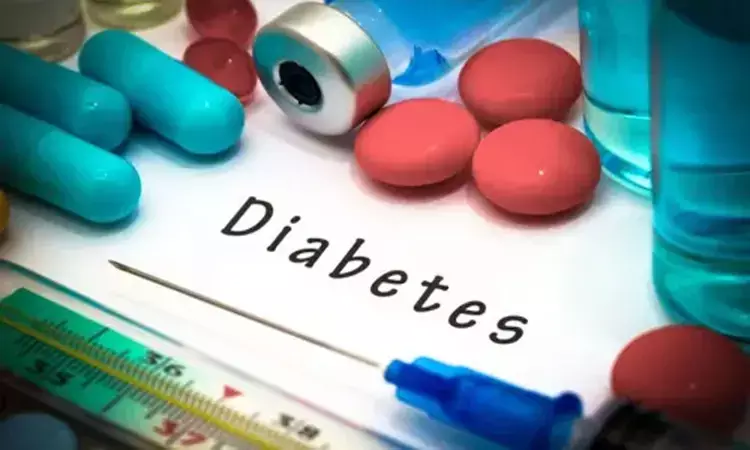- Home
- Medical news & Guidelines
- Anesthesiology
- Cardiology and CTVS
- Critical Care
- Dentistry
- Dermatology
- Diabetes and Endocrinology
- ENT
- Gastroenterology
- Medicine
- Nephrology
- Neurology
- Obstretics-Gynaecology
- Oncology
- Ophthalmology
- Orthopaedics
- Pediatrics-Neonatology
- Psychiatry
- Pulmonology
- Radiology
- Surgery
- Urology
- Laboratory Medicine
- Diet
- Nursing
- Paramedical
- Physiotherapy
- Health news
- Fact Check
- Bone Health Fact Check
- Brain Health Fact Check
- Cancer Related Fact Check
- Child Care Fact Check
- Dental and oral health fact check
- Diabetes and metabolic health fact check
- Diet and Nutrition Fact Check
- Eye and ENT Care Fact Check
- Fitness fact check
- Gut health fact check
- Heart health fact check
- Kidney health fact check
- Medical education fact check
- Men's health fact check
- Respiratory fact check
- Skin and hair care fact check
- Vaccine and Immunization fact check
- Women's health fact check
- AYUSH
- State News
- Andaman and Nicobar Islands
- Andhra Pradesh
- Arunachal Pradesh
- Assam
- Bihar
- Chandigarh
- Chattisgarh
- Dadra and Nagar Haveli
- Daman and Diu
- Delhi
- Goa
- Gujarat
- Haryana
- Himachal Pradesh
- Jammu & Kashmir
- Jharkhand
- Karnataka
- Kerala
- Ladakh
- Lakshadweep
- Madhya Pradesh
- Maharashtra
- Manipur
- Meghalaya
- Mizoram
- Nagaland
- Odisha
- Puducherry
- Punjab
- Rajasthan
- Sikkim
- Tamil Nadu
- Telangana
- Tripura
- Uttar Pradesh
- Uttrakhand
- West Bengal
- Medical Education
- Industry
Elevated levels of NT-proBNP tied to increased risk of Diabetes complications

Circulating N-terminal pro b-type natriuretic peptide (NT-proBNP) is a classic diagnostic and prognostic marker for heart failure. However, it is inversely associated with diabetes risk.
Healthy people - especially women - with elevated levels of the heart failure marker NT-proBNP have a lower risk of developing type 2 diabetes.
However, if these people develop diabetes nonetheless, they are more likely to suffer from macro- and microvascular complications such as heart attack, stroke, or severe damage to eyes, kidneys, or nerves. These are the findings of a recent study by DZD researchers that has now been published in Diabetes Care.
The NT-proBNP molecule is a biomarker used to predict or diagnose heart failure. On the other hand, it has a positive effect on insulin and glucose metabolism. NT-proBNP stimulates the breakdown of fat in fat cells. In the animal model, higher levels of this peptide also showed a protective effect against overweight and glucose intolerance. Furthermore, studies suggest that people with elevated baseline levels of NT-proBNP have a lower risk of developing type 2 diabetes. But what is the effect of elevated levels of NT-proBNP in people who do develop diabetes? Do they suffer more frequently from diabetes complications? Researchers from the DZD partner German Institute of Human Nutrition Potsdam-Rehbrücke (DIfE) investigated these questions together with colleagues from Tübingen University Hospital, University College Dublin and the Federal Institute for Risk Assessment in Berlin.
First, the researchers analyzed samples from a case cohort consisting of all the incident cases of diabetes and a random sample of EPIC Potsdam to determine whether the concentration of NT-proBNP in healthy people has an influence on diabetes risk. "We found an inverse association between NT-proBNP concentration and future risk of type 2 diabetes. With every doubling of NT-proBNP levels, the risk of diabetes decreased by about 9 percent," said first author Anna Birukov of DIfE. The influence of the NT-proBNP concentration is even more evident in women. There, the risk of diabetes decreased by 20 percent when the concentration of NT-proBNP was doubled.
In samples from 545 people who later developed diabetes, the researchers then investigated whether there was a correlation between elevated baseline NT-proBNP concentrations in a still healthy state and the risk of vascular complications. In this group, 133 people later developed microvascular and 50 people macrovascular complications **. "This showed that the NT-proBNP values are linearly associated with these diabetes complications," said Prof. Dr. Matthias Schulze, head of the study, summarizing the results. With each doubling of the baseline NT-proBNP concentration, the risk of severe damage to the eyes, kidneys or nerves increased by 20 percent and the risk of a heart attack or stroke by 37 percent.
"In the future, the measurement of NT-proBNP in plasma could be informative for monitoring the risk of diabetes-associated complications," Schulze said. The extent to which the peptide is suitable as a marker for the development of diabetes-related diseases should, however, be investigated in further prospective studies. The gender-specific associations between NT-proBNP and diabetes risk should also be validated in further prospective studies.
For more details click on the link: http://dx.
Hina Zahid Joined Medical Dialogue in 2017 with a passion to work as a Reporter. She coordinates with various national and international journals and association and covers all the stories related to Medical guidelines, Medical Journals, rare medical surgeries as well as all the updates in the medical field. Email: editorial@medicaldialogues.in. Contact no. 011-43720751
Dr Kamal Kant Kohli-MBBS, DTCD- a chest specialist with more than 30 years of practice and a flair for writing clinical articles, Dr Kamal Kant Kohli joined Medical Dialogues as a Chief Editor of Medical News. Besides writing articles, as an editor, he proofreads and verifies all the medical content published on Medical Dialogues including those coming from journals, studies,medical conferences,guidelines etc. Email: drkohli@medicaldialogues.in. Contact no. 011-43720751


